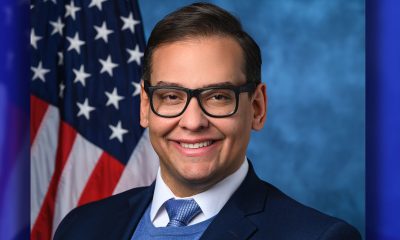Politics
Senate Creating Secret Encyclopedia of US Spy Programs

In this Dec. 9, 2014 file photo, Senate Intelligence Committee Vice Chair Sen. Dianne Feinstein, D-Calif. speaks to reporters on Capitol Hill in Washington. Trying to get a handle on hundreds of sensitive, closely held surveillance programs, the Senate intelligence committee is compiling a secret encyclopedia of American eavesdropping programs in an effort to improve congressional oversight of Americas sprawling global spying effort. (AP Photo/J. Scott Applewhite, File)
KEN DILANIAN, AP Intelligence Writer
WASHINGTON (AP) — Trying to get a handle on hundreds of sensitive, closely held surveillance programs, a Senate committee is compiling a secret encyclopedia of American intelligence collection. It’s part of an effort to improve congressional oversight of the government’s sprawling global spying effort.
Sen. Dianne Feinstein launched the review in October 2013, after a leak by former National Security Agency systems administrator Edward Snowden disclosed that the NSA had been eavesdropping on German Chancellor Angela Merkel’s cellphone. Four months earlier, Snowden had revealed the existence of other programs that vacuumed up Americans’ and foreigners’ phone call records and electronic communications.
“We’re trying right now to look at every intelligence program,” Feinstein told The Associated Press. “There are hundreds of programs we have found … sprinkled all over. Many people in the departments don’t even know (they) are going on.”
Feinstein and other lawmakers say they were fully briefed about the most controversial programs leaked by Snowden, the NSA’s collection of American phone records and the agency’s access to U.S. tech company accounts in targeting foreigners through its PRISM program. Those programs are conducted under acts of Congress, supervised by a secret federal court.
But when it comes to surveillance under Executive Order 12333, which authorizes foreign intelligence collection overseas without a court order, there are so many programs that even the executive branch has trouble keeping track of them, Feinstein said. Many are so sensitive that only a handful of people are authorized to know the details, which complicates the management challenge.
Lawmakers who serve on the intelligence committee sometimes have difficulty making sense of the information they receive, some of which can’t be shared even with some of their own staff.
Director of National Intelligence James Clapper has joked that only one entity in the universe has complete visibility over all the U.S. government’s secret intelligence programs — “That’s God.”
Feinstein, a California Democrat, initially wasn’t sure that Sen. Richard Burr of North Carolina, who took her place as chairman of the panel when Republicans took control of the Senate in January, would agree to continue the review. But Burr and Feinstein recently reached an agreement to do so, said Senate aides. They were not authorized to discuss the inner committee workings publicly and spoke only on condition of anonymity.
Two executive branch officials who had been detailed to the committee are returning to the executive branch and will not be replaced, the aides said, so the effort will be entirely the work of congressional staff. The project will end in September, the aides said.
Burr declined to comment. His spokeswoman, Rebecca Glover Watkins, said in an email that the committee “is constantly and continuously engaged in oversight of intelligence community activities. It is the very core of what the committee does, day in and day out, and it is a key component of the work done by the committee’s professional staff.”
Feinstein initiated the review, she said, after she and other lawmakers were taken by surprise by the revelation that the NSA was spying on the leader of a close ally.
At the time, Feinstein said the intelligence committee, which is regularly briefed on spying programs, had not been “satisfactorily informed,” about some NSA surveillance. “Therefore our oversight needs to be strengthened and increased.”
After that disclosure, President Barack Obama ordered his own review of NSA surveillance that resulted in the termination of some eavesdropping on the leaders of certain unidentified friendly countries.
The review will allow lawmakers to maintain and access information on all the programs, but will avoid creating a single document that amounts to a roadmap to American surveillance, said U.S. officials. They were not authorized to be quoted because some details are classified. Although the Senate intelligence committee has vaults, safes and secure computer networks, officials do not want to risk leaving such a file in the custody of the Senate.
If senators object to any of the surveillance, they can raise the issue in secret with Obama administration officials. They can’t force a change, but they can use their influence over legislation, budgets and nominations to press for it.
However, that influence has its limits, as Sens. Ron Wyden and Mark Udall discovered when they sought to warn about some of the NSA collection that Snowden ultimately leaked. They could not make their warnings clear enough without disclosing secrets.
___
Follow Ken Dilanian on Twitter at https://twitter.com/KenDilanianAP
Copyright 2015 The Associated Press. All rights reserved. This material may not be published, broadcast, rewritten or redistributed.
Bay Area
MAYOR BREED ANNOUNCES $53 MILLION FEDERAL GRANT FOR SAN FRANCISCO’S HOMELESS PROGRAMS
San Francisco, CA – Mayor London N. Breed today announced that the U.S. Department of Housing and Urban Development (HUD) has awarded the city a $53.7 million grant to support efforts to renew and expand critical services and housing for people experiencing homelessness in San Francisco.

FOR IMMEDIATE RELEASE:
Wednesday, January 31, 2024
Contact: Mayor’s Office of Communications, mayorspressoffice@sfgov.org
***PRESS RELEASE***
MAYOR BREED ANNOUNCES $53 MILLION FEDERAL GRANT FOR SAN FRANCISCO’S HOMELESS PROGRAMS
HUD’s Continuum of Care grant will support the City’s range of critical services and programs, including permanent supportive housing, rapid re-housing, and improved access to housing for survivors of domestic violence
San Francisco, CA – Mayor London N. Breed today announced that the U.S. Department of Housing and Urban Development (HUD) has awarded the city a $53.7 million grant to support efforts to renew and expand critical services and housing for people experiencing homelessness in San Francisco.
HUD’s Continuum of Care (CoC) program is designed to support local programs with the goal of ending homelessness for individuals, families, and Transitional Age Youth.
This funding supports the city’s ongoing efforts that have helped more than 15,000 people exit homelessness since 2018 through City programs including direct housing placements and relocation assistance. During that time San Francisco has also increased housing slots by 50%. San Francisco has the most permanent supportive housing of any county in the Bay Area, and the second most slots per capita than any city in the country.
“In San Francisco, we have worked aggressively to increase housing, shelter, and services for people experiencing homelessness, and we are building on these efforts every day,” said Mayor London Breed. “Every day our encampment outreach workers are going out to bring people indoors and our City workers are connecting people to housing and shelter. This support from the federal government is critical and will allow us to serve people in need and address encampments in our neighborhoods.”
The funding towards supporting the renewal projects in San Francisco include financial support for a mix of permanent supportive housing, rapid re-housing, and transitional housing projects. In addition, the CoC award will support Coordinated Entry projects to centralize the City’s various efforts to address homelessness. This includes $2.1 million in funding for the Coordinated Entry system to improve access to housing for youth and survivors of domestic violence.
“This is a good day for San Francisco,” said Shireen McSpadden, executive director of the Department of Homelessness and Supportive Housing. “HUD’s Continuum of Care funding provides vital resources to a diversity of programs and projects that have helped people to stabilize in our community. This funding is a testament to our work and the work of our nonprofit partners.”
The 2024 Continuum of Care Renewal Awards Include:
- $42.2 million for 29 renewal PSH projects that serve chronically homeless, veterans, and youth
- $318,000 for one new PSH project, which will provide 98 affordable homes for low-income seniors in the Richmond District
- $445,00 for one Transitional Housing (TH) project serving youth
- $6.4 million dedicated to four Rapid Rehousing (RRH) projects that serve families, youth, and survivors of domestic violence
- $750,00 for two Homeless Management Information System (HMIS) projects
- $2.1 million for three Coordinated Entry projects that serve families, youth, chronically homeless, and survivors of domestic violence
In addition, the 2023 CoC Planning Grant, now increased to $1,500,000 from $1,250,000, was also approved. Planning grants are submitted non-competitively and may be used to carry out the duties of operating a CoC, such as system evaluation and planning, monitoring, project and system performance improvement, providing trainings, partner collaborations, and conducting the PIT Count.
“We are very appreciative of HUD’s support in fulfilling our funding request for these critically important projects for San Francisco that help so many people trying to exit homelessness,” said Del Seymour, co-chair of the Local Homeless Coordinating Board. “This funding will make a real difference to people seeking services and support in their journey out of homelessness.”
In comparison to last year’s competition, this represents a $770,000 increase in funding, due to a new PSH project that was funded, an increase in some unit type Fair Market Rents (FMRs) and the larger CoC Planning Grant. In a year where more projects had to compete nationally against other communities, this represents a significant increase.
Nationally, HUD awarded nearly $3.16 billion for over 7,000 local homeless housing and service programs including new projects and renewals across the United States.
Activism
Oakland Post: Week of April 17 – 23, 2024
The printed Weekly Edition of the Oakland Post: Week of April 17 – 23, 2024

To enlarge your view of this issue, use the slider, magnifying glass icon or full page icon in the lower right corner of the browser window. ![]()
Barbara Lee
Congresswoman Barbara Lee Issues Statement on Deaths of Humanitarian Aid Volunteers in Gaza
On April 2, a day after an Israeli airstrike erroneously killed seven employees of World Central Kitchen (WCK), a humanitarian organization delivering aid in the Gaza Strip, a statement was release by Rep. Barbara Lee (D-CA-12). “This is a devastating and avoidable tragedy. My prayers go to the families and loved ones of the selfless members of the World Central Kitchen team whose lives were lost,” said Lee.

By California Black Media
On April 2, a day after an Israeli airstrike erroneously killed seven employees of World Central Kitchen (WCK), a humanitarian organization delivering aid in the Gaza Strip, a statement was release by Rep. Barbara Lee (D-CA-12).
“This is a devastating and avoidable tragedy. My prayers go to the families and loved ones of the selfless members of the World Central Kitchen team whose lives were lost,” said Lee.
The same day, it was confirmed by the organization that the humanitarian aid volunteers were killed in a strike carried out by Israel Defense Forces (IDF). Prior to the incident, members of the team had been travelling in two armored vehicles marked with the WCF logo and they had been coordinating their movements with the IDF. The group had successfully delivered 10 tons of humanitarian food in a deconflicted zone when its convoy was struck.
“This is not only an attack against WCK. This is an attack on humanitarian organizations showing up in the direst situations where food is being used as a weapon of war. This is unforgivable,” said Erin Gore, chief executive officer of World Central Kitchen.
The seven victims included a U.S. citizen as well as others from Australia, Poland, the United Kingdom, Canada, and Palestine.
Lee has been a vocal advocate for a ceasefire in Gaza and has supported actions by President Joe Biden to airdrop humanitarian aid in the area.
“Far too many civilians have lost their lives as a result of Benjamin Netanyahu’s reprehensible military offensive. The U.S. must join with our allies and demand an immediate, permanent ceasefire – it’s long overdue,” Lee said.
-

 Activism4 weeks ago
Activism4 weeks agoOakland Post: Week of March 27 – April 2, 2024
-

 #NNPA BlackPress4 weeks ago
#NNPA BlackPress4 weeks agoCOMMENTARY: D.C. Crime Bill Fails to Address Root Causes of Violence and Incarceration
-

 #NNPA BlackPress4 weeks ago
#NNPA BlackPress4 weeks agoMayor, City Council President React to May 31 Closing of Birmingham-Southern College
-

 #NNPA BlackPress4 weeks ago
#NNPA BlackPress4 weeks agoBeloved Actor and Activist Louis Cameron Gossett Jr. Dies at 87
-

 Community1 week ago
Community1 week agoFinancial Assistance Bill for Descendants of Enslaved Persons to Help Them Purchase, Own, or Maintain a Home
-

 Activism3 weeks ago
Activism3 weeks agoOakland Post: Week of April 3 – 6, 2024
-

 Business1 week ago
Business1 week agoV.P. Kamala Harris: Americans With Criminal Records Will Soon Be Eligible for SBA Loans
-

 Activism2 weeks ago
Activism2 weeks agoOakland Post: Week of April 10 – 16, 2024
























































